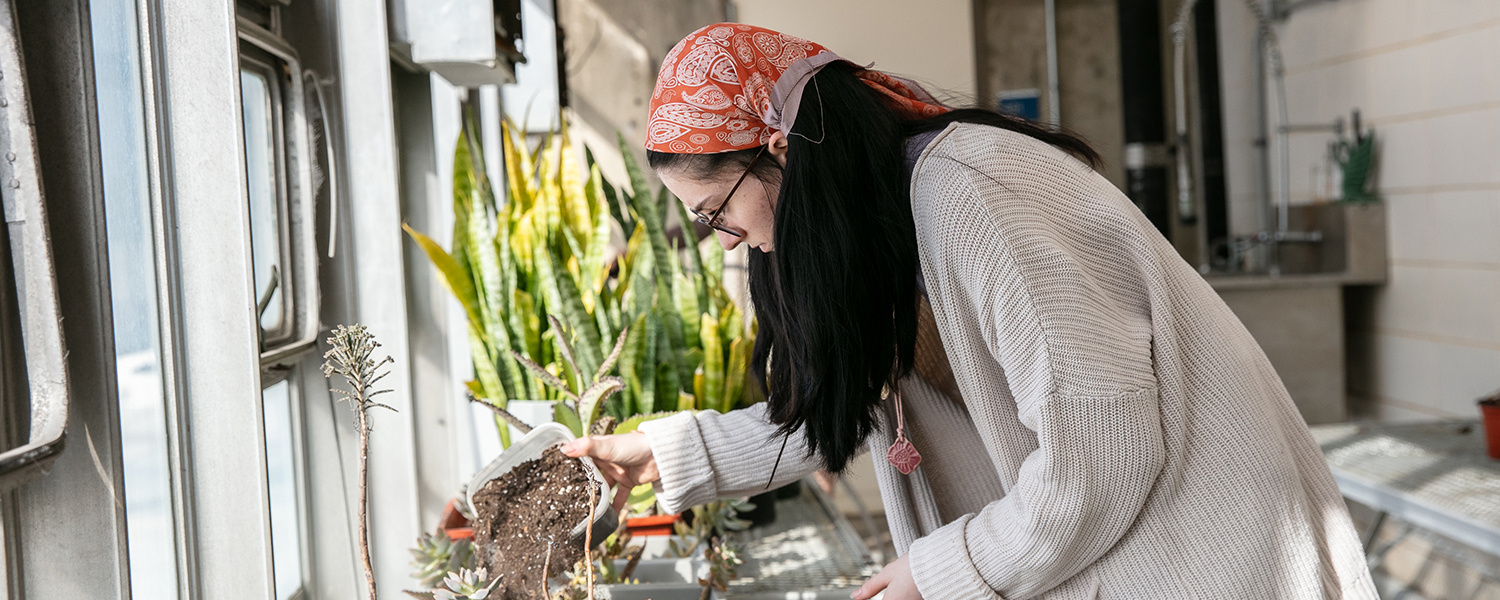La Salle University

What You’ll learn
We teach our students to be better citizens of this world. Environmental Science examines human impact on the environment and seeks solutions to those problems. In our 4-year undergraduate program, students learn about topics ranging from climate change to sustainability, treatment for soil/water/air pollution, and management of forests/wildlife.
Our students experience a dynamic and supportive, hands-on learning environment. Our program focuses on the development of a student’s critical thinking skills to:
- Solve environmental problems
- Use instruments for the collection and interpretation of environmental data in the lab and in the field
- Communicate science to both fellow scientists and non-experts
Our undergraduate students use our teaching laboratories, the Holroyd Greenhouse, Penllyn Field Station at the Wissahickon Creek, and research instrumentation, including as our scanning electron microscope, X-ray fluorescence spectrometer, X-ray diffractometer, and spectrophotometers for analysis of water and soil. Students also learn to use relevant software in Environmental Sciences, including Geographic Information Systems and R.
Why Study Environmental Science at La Salle?
With small class sizes and high-quality one-on-one advising, our students get access to hands-on learning with environmental instrumentation, access to teaching laboratories, our greenhouse, and Penllyn Field Station. Their hands-on education builds career-ready skills for their resumes and prepares them for internships, graduate school, and careers in the environmental field. Our location in Philadelphia also allows us to take advantage of the outdoor classroom to understand urban ecosystems, urban contamination, and to design healthier, sustainable cities.
For students interested in double majoring or minoring in Environmental Science, 86% of our students successfully complete a double major or minor. Adding Environmental Science into your degree can help broaden your skill set for different careers, opening doors to jobs ranging from Environmental Health to Renewable Energy, Sustainability, Science Communication and Environmental Law.
Highlighted Courses
POL 316: Environmental Law and Policy
This course examines an introduction to the rise of environmentalism in the United States. Addresses the major environmental statutes from the Clean Air and Clean Water Acts to the Endangered Species Act, RCRA and Superfund, and more.
ENV 401: Fundamentals of Soil Science
An overview of soil science, covering the physical, chemical, and biological properties of soils. Students will gain an understanding of soil formation, the classification of soils, and the chemical/biological reactions that occur in soils.
ENV 402: Environmental Air Quality
This course introduces the causes and effects of air pollutants on humans. The source of pollutants, their physical and chemical behavior in the atmosphere, and strategies to mitigate air pollution will be discussed.
BIO 403: Principles of Ecology
This course covers the interactions between plants and wildlife, interactions between populations, and interactions between communities.



Meet the Faculty
Our faculty consists of experts in ecology, environmental contamination, and climate change. As an interdisciplinary department, our students have also worked with interdisciplinary faculty on projects such as renewable energy and the reduction of food waste. We have every student in our program involved in cutting-edge research in or outside of the classroom to build their skillsets and to understand how real-world problems are solved.
Alice L. Hoersch, Ph.D.
My teaching philosophy is to engage students’ minds in the learning process by providing stimulating lectures, activities, lab assignments, field trips and by providing examples of how knowledge can influence the environmental decision-making process. I have worked to develop creative techniques that foster the learning process and lead to students’ development of a desire to learn course material. I encourage classroom participation by encouraging students to get their hands dirty (both figuratively and literally).

Career Opportunities
Graduates of our program have landed positions in fields such as:
- Environmental Consulting
- Environmental Conservation
- Environmental Assessment and Management
- Environmental Labs
- Environmental Education and Outreach
- Environmental Advocacy
- Environmental Health
Where are some of our graduates now?
- Environmental Specialist, EPA
- Conservation Specialist, National Park Service
- Environmental Engineer, UGI Utilities, Inc.
- Staff Scientist, Arcadis
- Graduate Schools in Environmental Health, Wildlife Ecology, and Environmental Policy
Ample interdisciplinary research and internship opportunities are available to students. For Environmental Research, students from Biology, Chemistry, and Integrated Science, Business, and Technology (ISBT) have all conducted research on Environmental Science projects, working one-on-one with our faculty. We take advantage of La Salle’s Penllyn Field Station at the Wissahickon Creek and the Holroyd Greenhouse in a number of our projects.
- Conducting biodiversity surveys of wildlife in urban and suburban environments
- Examining lead contamination in Philadelphia soils
- Analyzing water pollution at the Willow Grove Naval Air Station
- Culturing fungi for removing atmospheric CO2
- The Appalachian Trail Conservancy doing trail and conservation work
- Ecoservices Dominicana managing services to improve carbon footprints
- EMSL Analytical in a water chemistry lab
- Philadelphia Clean Water Action working on community outreach and environmental campaigns
- University of Delaware Extension Scholars Program conducting research on integrated pest management
- U.S. Forest Services managing forest land
La Salle has taught me to think outside of the box and, in my profession, that is necessary as no project is like the last.
Student Stories

Estefani Tretto-Ayres
Class of 2021
What is your current occupation, and what organization/company/business do you work for?
At the moment, I am a Project Coordinator at a non-profit called Sostenibilidad 3Rs in the Dominican Republic. I work directly with a United States Agency for International Development (USAID) flagship project named Clean Cities Blue Ocean (CCBO) which has the objective of reducing the plastics that flow into the ocean each year, especially in an island like Hispaniola.
What inspired you to go into Environmental Science?
I knew that I wanted to study something related to the environment and/ or conservancy. What caught my attention about Environmental Sciences was the fact that it was a multidisciplinary major in which I could be exposed to different areas of the fields that interested me in order to choose an area to specialize later.
How did your time as a student at La Salle help prepare you for your current position?
The scientific background with the practical aspects of laboratories, presentation of results, elaboration of maps and other instruments used to relate the academic work to the reality of the professional world are things that have been very helpful in my current position. Being able to articulate, plan, organize and strategize projects is another tool that has helped me succeed in my current work.
What advice do you have for future college students?
Take advantage of all the things that your professors send over to you, go to career related events, work on your resume early on, and try to think about what you would like to do and ask for advice on which steps to take. Most professors want to help you succeed and achieve your goals.

Joshua Weir
Class of 2022
What is your current occupation, and what organization/company/business do you work for?
I am a Hazard Communications Specialist for CRC Industries inc. Hazard Communications Specialists are in charge of identifying and communicating dangers in the workplace, such as potentially hazardous chemicals.
What inspired you to go into Environmental Science?
All the interwoven sciences and how they interact together to make a complex system full of chemistry, biology, and physics. The way they come together and form what we know as environmental science is both inspiring and intimidating. This duo makes this field so tempting to explore and uncover.
How did your time as a student at La Salle help prepare you for your current position?
Whether it’s in the lab testing a product for physical and health hazards or in my office writing up safety data sheets, I am never repeating myself. There is always a new formula or product to be tested and that means new and different problems to tackle. La Salle has taught me to think outside of the box and in my profession that is necessary as no project is like the last.
What advice do you have for future college students?
Stress less. It might sound counterintuitive but you want to fail as much as you can. You don’t learn by being good at something, you learn by being horrible at it and working hard to get better. Don’t be ashamed to do worse than your peers and don’t be afraid to admit that you did a bad job. Because the truth is no matter what, you are doing great. Allow yourself to know you’re doing great but strive to do even better! That is what makes a great student and a great employee – someone who can accept when they might not know the answer now, but who is also willing to work and search for it so that they know for the future.